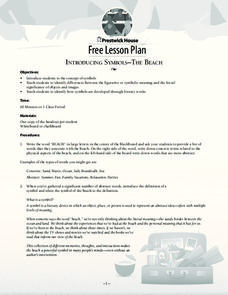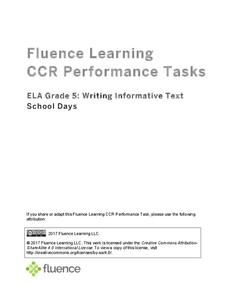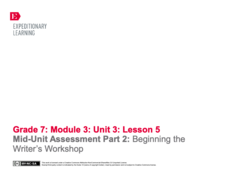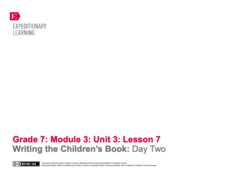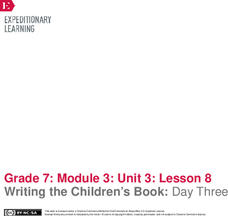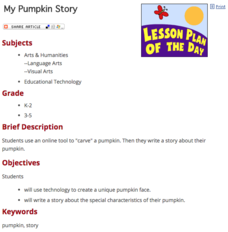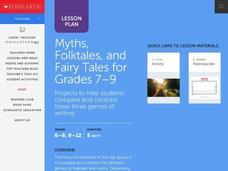Film English
Everyday
What would you do if you got an extra day every week? Partners share some information about their routines and lives and write compositions about one another based on the information. Each partner tries to guess what the other person...
Curated OER
Did You Know?
What would happen if you woke up one day and had become a housefly? What kinds of things would you do? Use the facts at the top of a worksheet to write a paragraph or short story about being a housefly.
Curated OER
Tangerine: Writing Assignment: Paul’s Witness Account
As a final assignment in a unit study of Edward Bloor's Tangerine, individuals assume the voice of Paul Fisher and craft the witness report Paul mentions in the final pages of the novel. A great way to assess the writer's understanding...
EngageNY
Preparing to Write Historical Fiction: Determining Characteristics of the Genre
A language arts instructional activity helps young writers identify elements that make up historical fiction. First, it guides them through elements of fictional pieces with vocabulary cards. Then, pupils work collaboratively to...
Curriculum Corner
Writing Prompts
Five questions and pictures make up a collection of writing assignments that spark imagination and reinforce creative writing skills. Class members respond to each question based on their observations of each picture.
Curriculum Corner
"Would You Rather?" Writing Prompts
Would you rather eat a cricket or a worm? Have your young writers decide and write about why. Choose from 35 different writing prompts to spark interest and creativity. Even your most reluctant writers are sure to enjoy. Each prompt also...
Prestwick House
Introducing Symbols–The Beach
Looking for a way to introduce class members to the concept of symbolism and multiple levels of meaning? Readers examine two different passages about the beach and consider how the writers use concrete objects, and places to represent...
Fluence Learning
Writing Informative Text: School Days
A three-part writing assessment challenges scholars to think critically about schools of the past and present. Learners read informative texts, answer questions to prepare for a discussion, research in small groups, complete a Venn...
EngageNY
Final Performance Task: Becoming Visible Again
It's task time! Scholars complete the final lesson plan of the unit by completing a performance task. Readers begin in groups, working on a task card. Once complete, they move to an independent task, writing responses to a prompt about...
EngageNY
Writing the Children’s Book: Day One
With a brief mini-lesson plan, scholars learn about using strong verbs, sensory details, and precise descriptions. Next, pupils continue working on their children's book storyboards before choosing their strongest pages for peer critiques.
EngageNY
Mid-Unit Assessment Part 2: Beginning the Writer’s Workshop
Writers learn about using sensory details as they revise bland sentences with more vivid language. Next, they begin writing the first drafts of their children's books, completing storyboards to effectively plan their writing.
EngageNY
Writing the Children’s Book: Day Two
Following a brief mini-lesson on using dialogue in fiction, young writers continue day two of their writing workshop. They work on the second half of their Children's Book Storyboards, and then they turn and talk with partners to reflect...
EngageNY
End of Unit Assessment and Independent Reading Review
Reader, writer, illustrator ... scholars wear many hats! Pupils become experts in recommending books to their classmates as they write reviews of their independent reading books. Next, after finishing the second draft of their children's...
EngageNY
The Performance Task: The Children’s Book—Final Draft
All good stories must come to an end. Writers review teacher feedback from their Children's Book Storyboards and make plans for revision. Next, they begin writing their final drafts and putting them together with their illustrations.
EngageNY
Writing the Children’s Book: Day Three
Illustrations are a key feature of children's books. Using the resource, pupils learn about adding illustrations to their children's books. Next, as they complete their storyboards and work on their second drafts, they consider their...
EngageNY
End of Unit Assessment: Perspectives on Natural Disasters
Caption this! Scholars complete the end of unit assessment by rereading In the Middle of the
Storm. Learners answer written response questions about the text, and then create drawings to accompany their work. To finish, they caption the...
National Endowment for the Humanities
Magical Elements in Magical Realism
How does Gabriel Garcia Marquez make the magical elements of his novel appear so real? That's the challenge facing readers of One Hundred Years of Solitude. Scholars examine the tone and descriptive details Garcia Marquez uses to make...
PBS
Exploring Identity and Intersectionality in Poetry
Just as Kermit the Frog notes, "It isn't easy being green!" it isn't easy occupying "multiple Identity spaces." Class members read and discuss poems by writers detailing what it is like when their identities are "oppressed."
Penguin Books
Educator's Guide: The Da Vinci Code by Dan Brown
Dan Brown's The Da Vinci Code is filled with secrets. Help readers find the clues, solve the riddles and puzzles, and unwrap the mysteries with a six-page guide that includes before, during, and after reading discussion questions and...
Penguin Books
Teacher’s Guide: The Diary of a Young Girl The Definitive Edition By Anne Frank
A line from Anne Frank's diary reads, "What is done cannot be undone, but one can prevent it happening again." Indeed, that is the hope for scholars who study her diary. The 19-page guide to the Definitive Edition of The Diary of a Young...
Curated OER
The "Write" Stuff: Strategies and Conventions for Imaginative Writing
Fifth graders develop and practice the steps involved in imaginative writing. They follow the steps/worksheets included and write imaginative stories of their own.
Education World
My Pumpkin Story
Have young pumpkin carvers use technology to create a unique pumpkin face and write a short story about the special characteristics of their pumpkin.
Scholastic
Connecting with Ruby Bridges
When Ruby Bridges entered an all-white school in New Orleans in 1960, she also entered history. Scholars consider what the experience must have been like for the young girl using two books that document her experience as well as a double...
Scholastic
Myths, Folktales, & Fairy Tales for Grades 7-9
Here is a must-have resource for studying fairy tales, myths, and folktales with your class! It includes instructional ideas, activities, and materials to support a month-long review of these three unique genres of writing.








